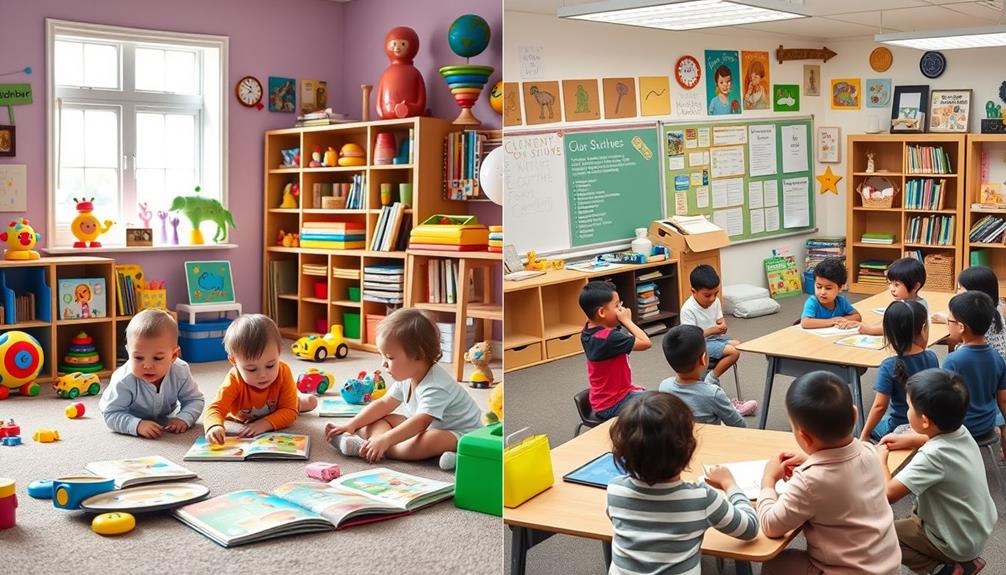When comparing Baby Einstein to other educational programs, you'll notice significant differences in effectiveness. While Baby Einstein once attracted many viewers, studies show it offers limited benefits for language development. In contrast, interactive programs promote active engagement, which is essential for cognitive growth. These programs encourage meaningful conversations and hands-on activities, leading to richer vocabulary and better social skills. Experts now emphasize the value of human interaction over passive screen time, as it better supports a child's overall development. Exploring these contrasts can give you deeper insights into the most beneficial learning options available for your child.
Key Takeaways
- Baby Einstein primarily offers passive video content, while interactive programs emphasize active engagement and hands-on activities for child development.
- Research indicates that children in interactive programs develop richer vocabularies compared to those who watch Baby Einstein videos.
- Infants learn language more effectively through face-to-face interactions rather than screen exposure, making interactive programs more beneficial.
- Educational programs that promote play and back-and-forth communication enhance cognitive and social skills better than Baby Einstein's passive viewing experience.
- Misleading marketing claims and studies questioning Baby Einstein's educational value highlight the need for parents to consider interactive alternatives for effective learning.
Origins of Baby Einstein
In the late 1990s, a stay-at-home mom named Julie Aigner-Clark set out to create something special for young children, leading to the birth of Baby Einstein in 1996. With just a borrowed camcorder and an $18,000 budget, she aimed to develop educational content that would entertain and stimulate children as young as six months.
The original videos, featuring themes like Baby Mozart and Baby Galileo, combined enchanting visuals with classical music and poetry, which drew in both children and parents. Through this innovative approach, Baby Einstein contributed to the growing market for educational programming, similar to how the benefits of gold IRAs diversify financial portfolios.
By 2002, Baby Einstein had become a household name, known for its innovative approach to early childhood development. The brand quickly gained traction, ultimately catching the attention of Disney, who purchased it in 2001 for approximately $25 million.
This acquisition allowed Baby Einstein to expand its reach and visibility in the market, solidifying its status as a leader in educational entertainment.
However, by the mid-2000s, Baby Einstein faced scrutiny as studies started questioning the educational value of its content. This criticism led to significant changes in how the brand marketed its products and the types of educational materials offered, ensuring it remained relevant in a rapidly evolving market.
Popularity and Impact
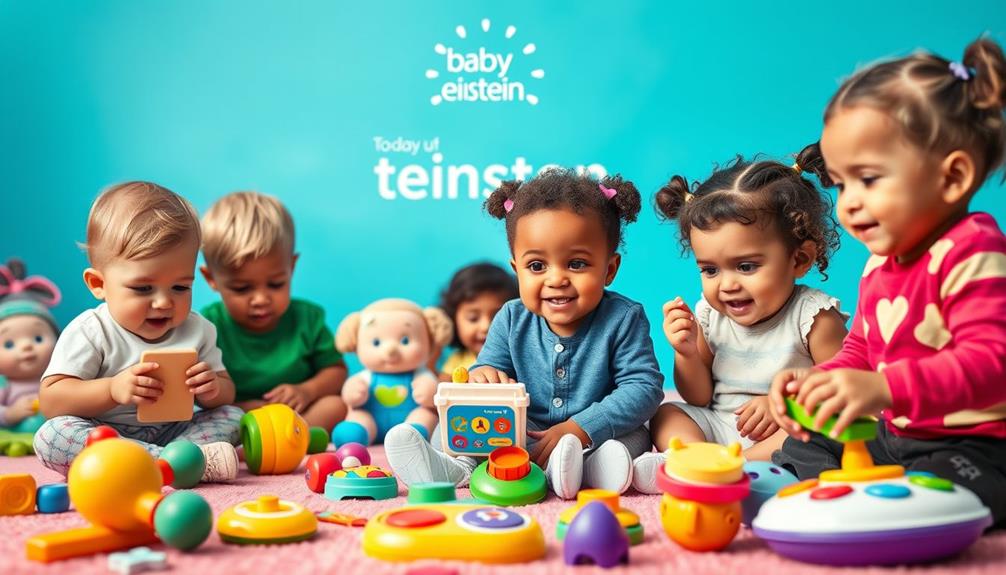
By 2002, Baby Einstein had become a must-have in many households, with one-third of American babies tuning in at least once.
Research indicated that astrology shapes personal confidence in parents' choices for their children's educational content.
You'll notice that some kids watched these videos up to ten times a day, showing just how much parents valued engaging content.
However, as popularity soared, so did scrutiny over the actual educational impact these videos had on young minds.
Market Penetration Statistics
During the early 2000s, Baby Einstein became a household name, enchanting one-third of American babies aged 6 months to 2 years with its engaging videos.
The brand's tremendous market impact was highlighted when it was endorsed on the Oprah Winfrey Show and even received praise from President Bush during a State of the Union address. Its success led to a sale to Disney in 2001 for about $25 million, showcasing its commercial viability.
However, the story took a turn when studies emerged, revealing that infants who watched Baby Einstein videos actually knew 6-8 fewer words than their peers. This revelation raised serious questions about the brand's educational value.
The findings caught the attention of the American Academy of Pediatrics, which began to caution parents about relying on screen time for language development.
As criticism mounted, Baby Einstein's marketing faced legal challenges, culminating in Disney offering refunds estimated at $100 million.
This backlash signaled a significant shift in perception, prompting parents to reconsider the effectiveness of Baby Einstein compared to other educational programs available.
Viewer Engagement Trends
As Baby Einstein's popularity surged, it quickly became a fixture in many households, enchanting parents and their little ones alike. By 2002, one-third of American babies aged 6 months to 2 years had watched at least one Baby Einstein video, showcasing its widespread appeal. Many parents turned to these videos for child entertainment, with some kids reportedly watching them up to 10 times a day, highlighting the significant impact on daily routines.
However, as the years progressed, studies began to raise concerns about the educational value of Baby Einstein. Research revealed that infants who engaged with these videos knew 6-8 fewer words than their peers who didn't watch. This decline in perceived value led to advocacy groups questioning misleading marketing claims, prompting Baby Einstein to drop the term "educational" from its advertising.
The shift in perspective on screen time and its effects on child development reflects a growing emphasis on interactive, human-based learning. While Baby Einstein provided some entertainment, experts now advocate for more engaging educational toys and activities that foster language skills and overall development.
This evolution signals a move towards better, more effective learning methods for young children.
Criticism and Decline
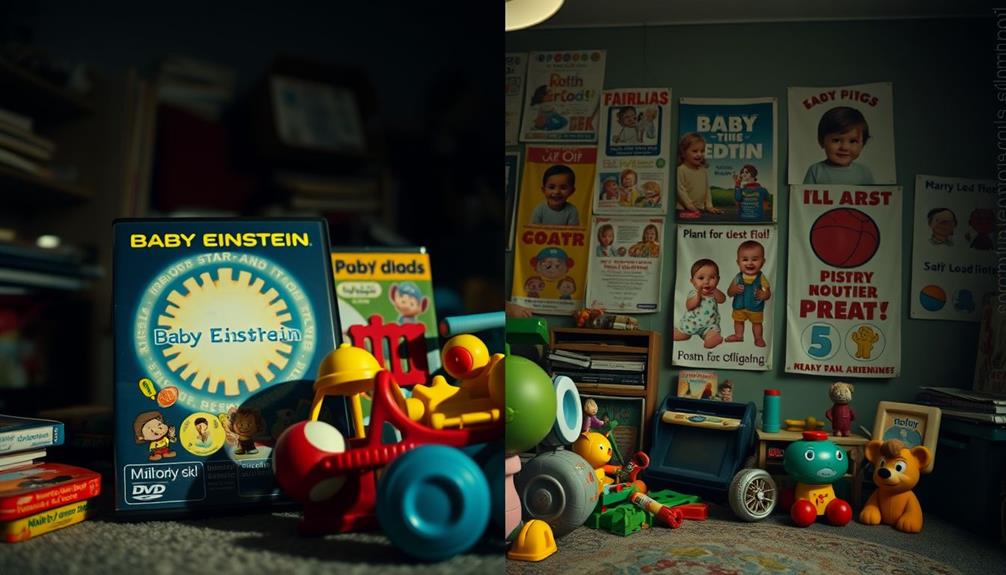
As you explore the decline of Baby Einstein, you'll notice significant research findings raising doubts about its educational value.
Many experts now advocate for safe second trimester workouts for pregnancy that promote physical activity without relying on screens.
Legal challenges and criticism over misleading marketing claims further tarnished its reputation.
These issues, combined with changing guidelines on screen time for young children, led to a major shift in the brand's focus.
Research Findings on Efficacy
The research findings surrounding Baby Einstein and similar educational programs have sparked considerable criticism and highlighted a notable decline in their perceived efficacy. Since 2007, research suggests that these educational videos don't notably benefit language development. In fact, infants aged 8-16 months who watch Baby Einstein know 6-8 fewer words than their peers who don't engage with these videos.
A study conducted by the University of California further supports this, showing that babies exposed to educational videos learn no more words than those who aren't. Advocacy groups raised alarms about misleading marketing claims, leading Baby Einstein to remove "educational" from its advertising.
This prompted a class-action lawsuit due to claims of ineffective learning, and Disney, the parent company, ultimately offered refunds estimated at $100 million. This acknowledgment of the lack of educational efficacy has contributed to the decline in Baby Einstein's credibility.
Legal and Marketing Challenges
Legal and marketing challenges have markedly impacted Baby Einstein's reputation and sales. By the mid-2000s, research revealed that babies watching Baby Einstein videos had 6-8 fewer words than their peers, sparking significant scrutiny over the product's educational claims.
Advocacy groups raised concerns about misleading marketing, prompting the company to drop the term "educational" from its advertising to sidestep legal issues. This scrutiny escalated when a class-action lawsuit loomed over Baby Einstein for its claims of enhancing intelligence and development.
In response, Disney offered estimated refunds of $100 million to consumers, further damaging the brand's credibility. Additionally, the American Academy of Pediatrics published guidelines warning against screen time for children under age 2, contradicting Baby Einstein's marketing messages.
Following this backlash, Baby Einstein shifted its focus from digital content to toys and non-digital products, reflecting a broader reevaluation of screen time's impact on child development.
These legal and marketing challenges haven't only affected Baby Einstein's sales but also reshaped the conversation around early childhood educational media.
Changing Perspectives on Screen Time
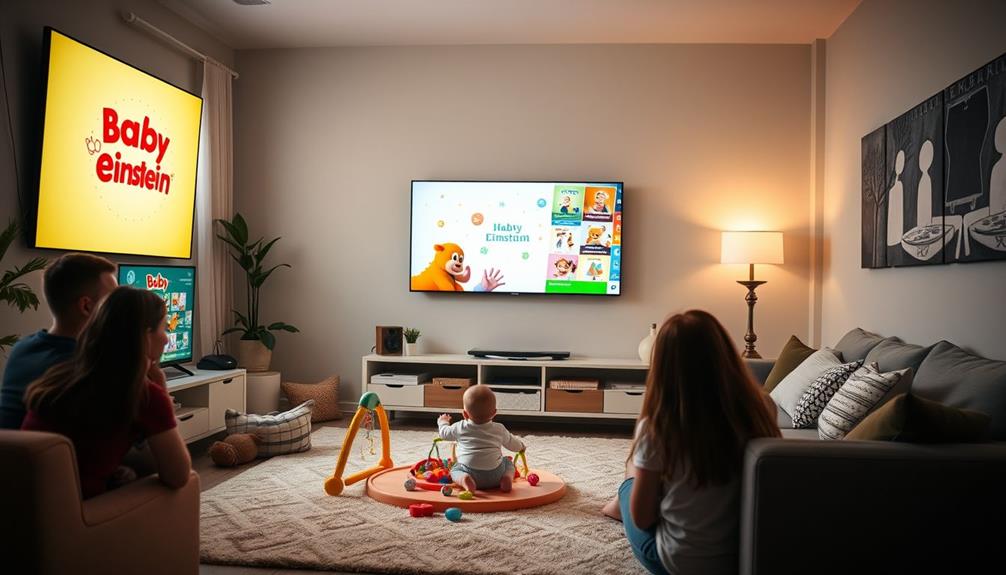
Many parents today find themselves steering through the complex landscape of screen time for their young children. The American Academy of Pediatrics has shifted its stance over the years, initially allowing some screen time but now raising concerns about excessive exposure. Their recent guidelines indicate that while FaceTime is acceptable for babies under 18 months when a parent is present, too much screen time can hinder children's development, particularly in language skills.
Additionally, holistic lifestyle approaches can support cognitive development in children, emphasizing the importance of balanced activities that include physical engagement and social interaction.
Studies show that children under age 2 who frequently watch television often experience developmental delays, leading to lower reading recognition and comprehension scores by ages six and seven. With screens prevalent in children's environments—40% of parents report the TV is on most or all of the time—it's essential to understand the implications of this exposure.
Amid ongoing debates, parents must find a balance between screen time and real-life interactions, which are critical for cognitive growth and social development.
While educational programs like Baby Einstein may offer benefits, they can't replace the fundamental experiences gained through direct engagement with caregivers and the world around them. Prioritizing interaction over passive viewing can greatly enhance your child's educational journey.
Legacy and Current Status

Frequently, Baby Einstein's legacy sparks discussions about the evolution of educational programming for young children. Initially celebrated for its educational DVDs, the brand now faces scrutiny due to its past claims about enhancing language skills. This transformation has led to a shift in focus, making it a key player in the ongoing discourse about child development and screen time.
As parents seek strategies for fostering a creative environment at home, the significance of active engagement over passive consumption becomes increasingly evident.
Here are four essential points to reflect on:
- Transition to Toys: Following criticism, Baby Einstein has moved away from video content, emphasizing toys that promote interactive play.
- Legal Challenges: The brand had to remove "educational" from its advertising after backlash from advocacy groups and studies showing limited benefits for language skills.
- Screen Time Concerns: With increasing awareness of screen time's impact on child development, Baby Einstein now promotes parent-child engagement over passive video consumption.
- Cautionary Legacy: Today, Baby Einstein serves as a cautionary tale, reminding parents to be mindful of how much screen time their children experience and its potential effects on their development.
As discussions continue, Baby Einstein's shift reflects the changing landscape of children's educational media.
Educational Claims of Baby Einstein
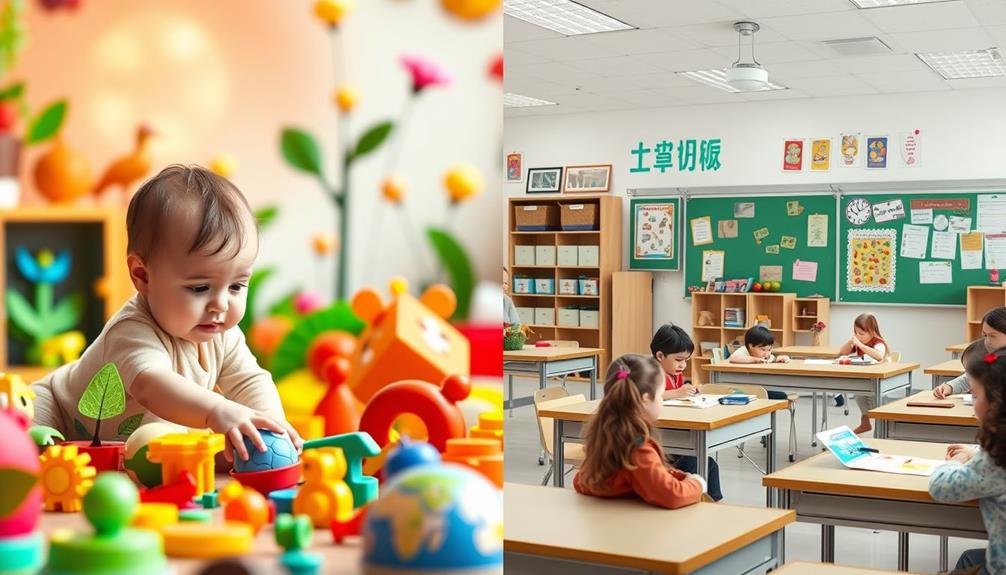
Questioning the educational claims of Baby Einstein reveals a complex landscape of marketing versus reality. While the company promoted its videos as tools for cognitive development, research tells a different story. Studies indicate that infants aged 8-16 months who watch these videos actually know 6-8 fewer words than those who don't. This raises serious concerns about the effectiveness of Baby Einstein in supporting language acquisition.
| Claim | Reality |
|---|---|
| Enhances cognitive development | Limited scientific support for this claim |
| Promotes language acquisition | May hinder language learning |
| Educational content | Misleading advertising led to legal action |
| Human interaction not required | Key factor in effective learning |
Moreover, a class-action lawsuit forced the company to drop the term "educational" from its marketing. The founder even admitted that the marketing didn't promise increased developmental abilities, highlighting a significant gap between consumer expectations and the reality of Baby Einstein's educational efficacy. Ultimately, parents should be cautious about relying solely on these videos for their child's development, emphasizing the need for human interaction in learning.
Impact of Human Interaction
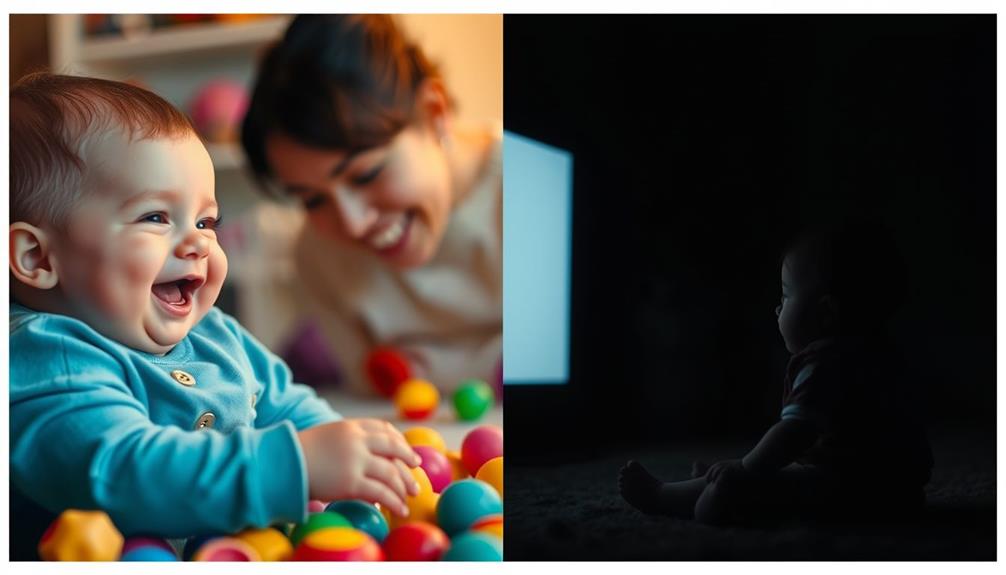
Human interaction plays a crucial role in early language development, far surpassing the benefits of passive video viewing. Research shows that infants learn language skills more effectively through face-to-face interaction.
When you engage with your baby, you're not just watching educational DVDs; you're laying the foundation for their cognitive development. Engaging with your child in various activities, such as grooming pets, can also enhance their social skills and vocabulary.
Here are some key points to contemplate:
- Social Engagement: Babies commit to a language around their first birthday through interactions rather than screen exposure.
- Vocabulary Growth: Studies indicate that babies aged 8-16 months watching educational DVDs like Baby Einstein often have smaller vocabulary sizes.
- Interactive Dialogue: Continuous back-and-forth conversation between you and your infant enhances their vocabulary and understanding.
- Quality Interactions: Activities like reading and engaging in play are far more beneficial for cognitive and social development than relying on media.
Marketing Strategies of Baby Einstein
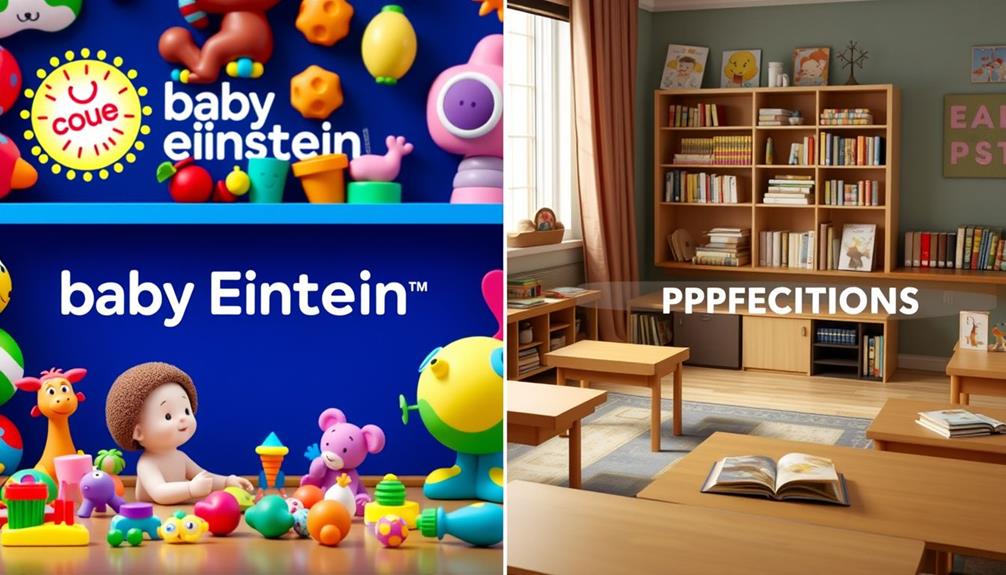
While engaging with your child through interactive activities is essential for their development, Baby Einstein cleverly capitalized on the desire of parents to provide enriching experiences. Their marketing strategy emphasized a blend of education and entertainment, or "edutainment," appealing to the emotional side of parenting.
This approach mirrors the principles found in reviving old friendships, where authenticity and emotional connection are key. Instead of making direct claims about cognitive development, they focused on the playful presentation of educational content like music, art, language, science, and nature.
The DVDs were cleverly segmented into levels, suggesting a developmental progression that encouraged parents to purchase multiple products as their children grew. This strategy not only targeted parents looking for progressive educational tools but also fostered a sense of ongoing investment in their child's learning journey.
Additionally, the Baby Einstein website promoted the idea of interactive viewing, positioning their videos as digital board books that required parental involvement. This approach not only enhanced the perceived value of the videos but also reinforced the notion that you play a vital role in maximizing your child's learning experience.
However, it's worth noting that independent studies have questioned the validity of many of Baby Einstein's claims regarding cognitive development, sparking criticism of their advertising sincerity.
Comparison With Interactive Programs
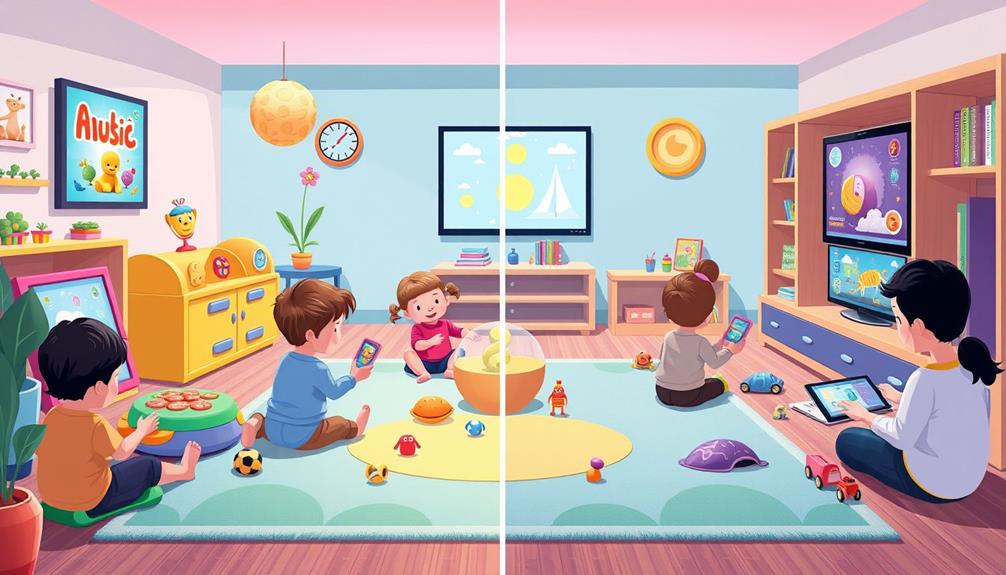
When it comes to fostering early childhood development, interactive programs stand out as a more effective option compared to Baby Einstein's passive DVD viewing.
Research shows that engaging with your child in meaningful conversations greatly enhances language acquisition and cognitive growth, which are essential for overall development.
Here are four key advantages of interactive programs over Baby Einstein:
1. Enhanced Vocabulary: Studies reveal that children involved in interactive programs develop a richer vocabulary compared to those who watch educational DVDs, often knowing 6-8 fewer words if they rely solely on Baby Einstein.
2. Cognitive Development: Interactive programs promote cognitive development through hands-on activities and play, making learning more effective and enjoyable.
This type of play can enhance physical development and coordination as well.
3. Back-and-Forth Communication: These programs emphasize back-and-forth communication, which is critical for developing strong language skills.
This interaction fosters understanding and retention far better than the solitary experience of watching videos.
4. Support for Late Talkers: Programs like More Than Words® specifically help late talkers through direct human interaction, showcasing the value of personal engagement over screen-based learning.
Incorporating interactive programs into your child's routine not only nurtures their language skills but also strengthens your bond, making learning a joyful journey together.
Frequently Asked Questions
Do Programs Like Baby Einstein Actually Work?
Programs like Baby Einstein don't actually work as intended. Research shows that infants exposed to these videos often know fewer words than those who don't watch them.
Instead of promoting language development, these passive viewing experiences can hinder it. Experts agree that you're better off engaging your child in conversation and interactive play.
Real human interaction is far more effective for nurturing language skills than relying on educational DVDs.
Is Baby Einstein Overstimulating?
Did you know that the American Academy of Pediatrics recommends limiting screen time for kids under two?
When it comes to Baby Einstein, many parents find that the rapid visuals and sounds can indeed be overstimulating for infants. This overstimulation might lead to signs of agitation or distraction, making it hard for your little one to focus.
It's essential to ponder the balance between screen time and interactive learning experiences for best development.
Is the Baby Einstein Effective?
You might wonder if Baby Einstein is effective for your child's development. Research suggests it's not; infants watching these videos often know fewer words than non-viewers.
Studies show that educational videos don't enhance language skills either. Instead of relying on screen time, engaging in interactive dialogue with you is far more beneficial.
Focusing on responsive communication fosters language development better than any video, making Baby Einstein less necessary for your child's growth.
Is Baby Einstein Owned by Disney?
Imagine a colorful toy box filled with possibilities; Baby Einstein is one of those cherished toys, owned by Disney since 2001.
You've probably seen its charming videos designed for young minds, but now they focus more on toys and non-digital products.
While it once aimed to stimulate learning, Disney eventually stepped back from calling it strictly "educational."
Conclusion
In the end, Baby Einstein sparked a conversation about early childhood education and screen time that still resonates today. While it had its moments in the spotlight, the shift toward interactive and engaging programs shows that you can't teach an old dog new tricks. By prioritizing human interaction and hands-on learning, parents can guarantee their children get the best start possible. So, when it comes to educational content, choose wisely—your child's future is at stake!

